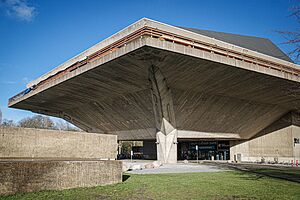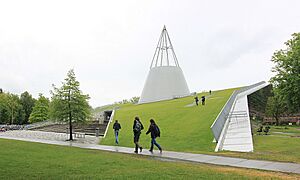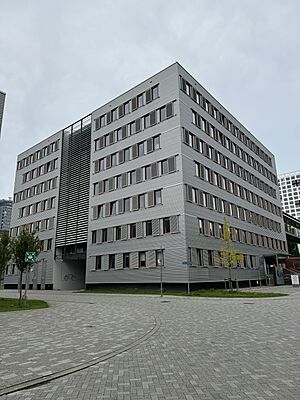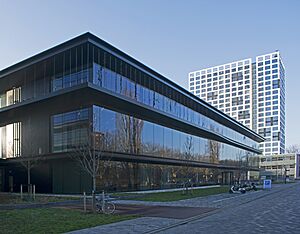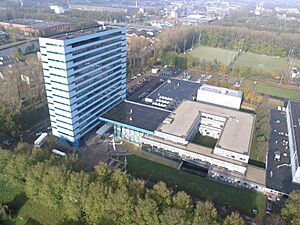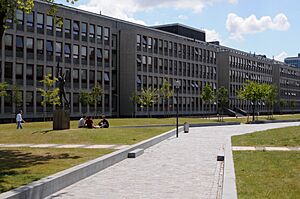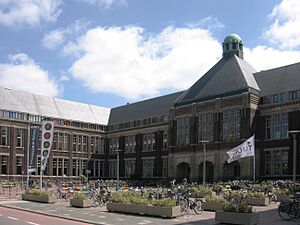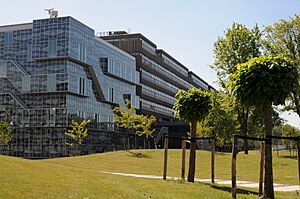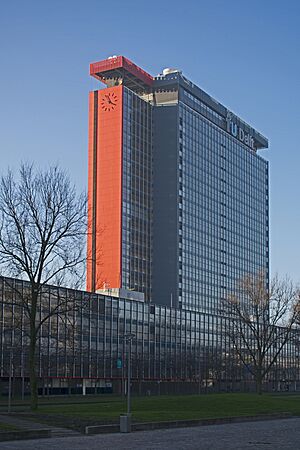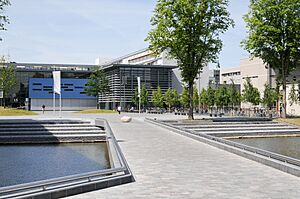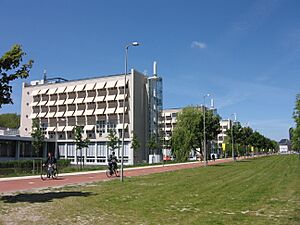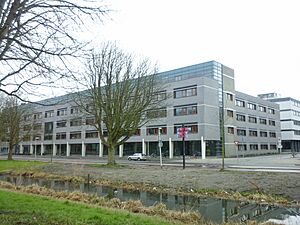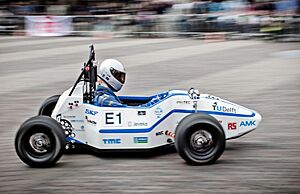Delft University of Technology facts for kids
|
Technische Universiteit Delft
|
|
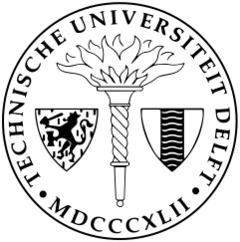 |
|
|
Former names
|
Koninklijke Akademie van Delft Polytechnische School van Delft Technische Hoogeschool van Delft |
|---|---|
|
Motto in English
|
Challenge the Future |
| Type | Public, technical |
| Established | 1842 |
| Budget | € 1,093 million (2024) |
| President | (Tim) van der Hagen |
| Rector | (Tim) van der Hagen |
|
Academic staff
|
4,415 (including 1,365 faculty members of all ranks, 29.9% female, 49.6% international, full-time equivalents in 2024) |
|
Administrative staff
|
2,870 (2024) |
| Students | 26,971 (2024) |
| Undergraduates | 13,484 (2024) |
| Postgraduates | 13,047 (2024) |
| 3,549 (2024) | |
| Location |
,
52°0′6″N 4°22′21″E / 52.00167°N 4.37250°E |
| Campus | Urban (university town) |
| Colors | Cyan, black and white |
| Affiliations | IDEA Climate-KIC CESAER EUA 4TU UNITECH SEFI SAE TPC ATHENS PEGASUS ENHANCE Alliance |
 |
|
The Delft University of Technology (often called TU Delft) is the oldest and largest public technical university in the Netherlands. It is located in the city of Delft. This university is special because it focuses on subjects like engineering, technology, computing, design, and natural sciences.
TU Delft is known as one of the best technical universities in Europe. It is often ranked highly for its architecture and engineering programs around the world. For example, in 2024, it was ranked 3rd globally for architecture and 13th for Engineering & Technology. It also ranked 3rd for mechanical and aerospace engineering, and 3rd for civil and structural engineering.
The university has eight main departments, called faculties, and many research institutes. About 27,000 students study here, including those working on their first degrees and those doing advanced studies. The university also has over 3,500 students working on their doctoral degrees and nearly 4,500 staff members.
TU Delft was started on January 8, 1842, by King William II. It began as a royal academy to train people for jobs in the Dutch East Indies. Over time, it grew and changed. It became a polytechnic school in 1864 and a full university in 1905. In 1986, it officially became the Delft University of Technology.
Famous Nobel laureates like Jacobus Henricus van 't Hoff, Heike Kamerlingh Onnes, and Simon van der Meer have been connected to TU Delft. The university is also part of several groups of universities, such as the IDEA League and 4TU.
Contents
University History
Early Beginnings (1842–1864)
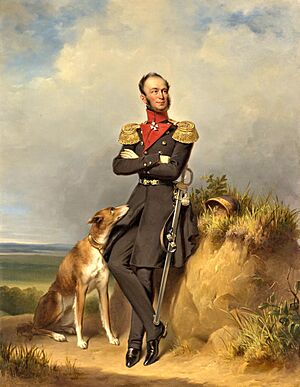
TU Delft started on January 8, 1842. King William II of the Netherlands named it the Royal Academy for the education of civilian engineers, for serving both nation and industry, and of apprentices for trade. One of its main goals was to train civil servants for the Dutch colonies. The first leader of the academy was Antoine Lipkens. The Royal Academy's first building was at Oude Delft 95 in Delft. In 1863, new rules were made for technical education in the Netherlands.
Becoming a Polytechnic School (1864–1905)
On June 20, 1864, the Royal Academy became the Polytechnic School of Delft. This new school trained engineers and architects. These skills were very important during the fast growth of industries in the 1800s, known as the Industrial Revolution.
Becoming a University (1905–1986)
On May 22, 1905, the school's name changed again to Technical College (Institute) of Delft. This change showed that the school was now a full university and could give out academic degrees. About 450 students were studying there at that time. Queen Wilhelmina officially opened the new school on July 10, 1905. The first doctoral degree was given out in 1905.
Most of the university buildings were in the center of Delft back then. Student groups also grew with the university. The first one, Delftsch Studenten Corps, started in 1848. In 1917, a special garden for technical plants was created. Today, it is known as the Botanical Garden of TU Delft. The first female professor, Toos Korvezee, was also appointed during this period.
Delft University of Technology Today (1986–Present)
After World War II, TU Delft grew very quickly. A program called Studium Generale was started. It helps share knowledge about culture, technology, and science. Because more and more students joined, the first Reception Week for First Year Students (OWEE) began in 1974. This week is still a tradition at TU Delft.
On September 1, 1986, the school officially changed its name to Delft University of Technology. This name showed the high quality of its education and research. In 1997, the 13 faculties were combined into 9 to make the university run more smoothly. In the early 1990s, special days called Girls Study Technology were created to encourage more female students to join.
Since 2006, all university buildings are located outside the old city center of Delft. In 2007, the building for the Material Sciences department was sold and later taken down. A new building for the Haagse Hogeschool was built there. In September 2009, many applied sciences institutes moved closer to the university campus in Delft.
In 2007, the three main technical universities in the Netherlands (TU Delft, TU Eindhoven, and University of Twente) formed a group called 3TU.
On May 13, 2008, the building of the Faculty of Architecture was destroyed by a fire. Luckily, the architecture library and many models were saved. The Faculty of Architecture is now in the university's old main building.
University Logo
The logo of TU Delft has changed over the years. The current logo uses the university colors: cyan, black, and white. The letter "T" has a flame on top. This flame represents the fire that Prometheus brought to humans from Mount Olympus. Because of this story, Prometheus is sometimes seen as the first engineer and is an important symbol for the university. A statue of Prometheus was in the center of the Mekelpark campus until it was stolen in 2012.
University Campus
At first, all university buildings were in the old city center of Delft. But in the second half of the 1900s, they started moving to a separate university area. The last university building in the city center was the library, which moved to a new building in 1997. In 2006, a plan for a new university area called Mekelpark was approved. This plan turned the area around the main road (Mekelweg) into a green campus heart. The new park made it safer for bikes and people walking.
Mekelpark Campus Area
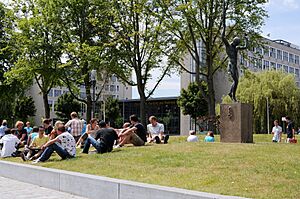
The Mekelpark was opened on July 5, 2009. It is named after Jan Mekel, a professor and World War II resistance fighter. The park replaced old parking lots and roads. It has an 832-meter-long path that makes it easy to walk between university buildings. There are also long stone benches along the path. Some buildings around Mekelpark are quite special.
The Aula Building
The TU Delft Aula building was designed by architects Jo van den Broek and Jaap Bakema. It opened on January 6, 1966. It is a good example of a style called Brutalist architecture. The Aula is at the entrance of Mekelpark. It has the main university restaurant, a store, lecture halls, auditoriums, a congress center, and administrative offices. All important ceremonies, like doctoral promotions, happen here.
The Library
The TU Delft Library was built in 1997. It is located behind the university's Aula. The roof of the library is covered with grass, which helps keep the building warm in winter and cool in summer. The building lifts up on one side, so you can walk onto the roof. A tall steel cone sits on top, giving it a unique look. The library won a special award, the Dutch National Steel Prize, in 1998. It also hosts the 4TU.Centre for Research Data, which stores research information for technical sciences in the Netherlands.
Sports and Culture Center
The TU Delft Sports and Culture Center, now called X, is located at the edge of Mekelpark. It opened in 1995 and has been expanded and updated since then. It offers many activities for students and staff.
TU Delft Museums
Three museums are connected to the university: Science Centre Delft, Mineralogy-geology museum, and the Beijerinck and Kluyver archive.
The Science Centre Delft opened in September 2010. It shows visitors current research projects from TU Delft, like the Eco Runner and Nuna solar cars.
The Beijerinck and Kluyver archive has a collection of items from two scientists linked to the university.
The Mineralogy-geology museum is part of the Civil Engineering and Geosciences faculty. It has about 200,000 geological, mineralogical, and crystallographical items. Some of the oldest items date back to 1842.
Botanical Garden
The TU Delft botanical garden started in 1917. It was created to help develop tropical agriculture for the Dutch colonies. Today, it has over 7,000 different kinds of plants, including tropical and subtropical plants, herbs, and ornamental plants. It covers almost 2.5 hectares. More than 2,000 unique species are kept in the university's greenhouses. The botanical garden is open to the public.
Building 28 and Echo (Building 29)
Building 28 is the main building for Computer Science on campus. It has research groups, labs, study areas for students, and meeting rooms.
The 'Echo' building (Building 29) was designed for lecture halls, project rooms, and student study areas. It also houses some Computer Science research offices. This building produces its own energy and won a special award, the World Prix Versailles, in 2023.
TU Delft | Campus The Hague
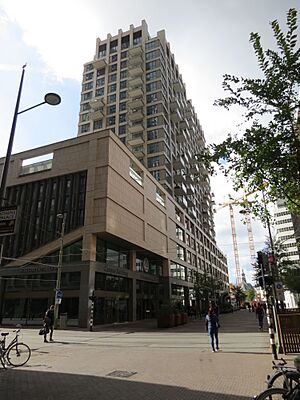
In September 2016, TU Delft opened a new campus in The Hague. This campus is home to the Engineering and Policy Analysis program. It is close to government offices and international groups, which is helpful for students studying how technology and policy work together.
TU Delft uses the 5th floor of the Wijnhaven Building in The Hague. This building is shared with Leiden University. In 2023, TU Delft announced plans to expand further in The Hague. A new joint university facility with Leiden University and others is set to open in 2026. It will be called University Campus Spui.
University Faculties
TU Delft has eight main faculties. Each faculty focuses on different areas of study.
- Aerospace Engineering (AE)
- This faculty studies how to design and build aircraft and spacecraft.
- Applied Sciences (AS)
- This faculty explores subjects like biotechnology, chemical engineering, and quantum science.
- Architecture and the Built Environment (BK)
- Here, students learn about designing buildings, cities, and managing construction projects.
- Civil Engineering and Geosciences (CEG)
- This faculty focuses on building structures like bridges, managing water, and studying the Earth.
- Electrical Engineering, Mathematics and Computer Science (EEMCS)
- This faculty covers topics like electricity, computer science, and advanced mathematics.
- Industrial Design Engineering (IDE)
- Students here learn to design new products and systems that are useful and user-friendly.
- Mechanical Engineering (ME)
- This faculty deals with machines, robotics, materials, and energy systems.
- Technology, Policy and Management (TPM)
- This faculty looks at how technology, government rules, and management work together in society.
There are also two important Research Institutes:
- QuTech (focuses on quantum computing and quantum internet)
- TU Delft Reactor Institute
University Education
Since 2004, TU Delft's education system has three main levels: the bachelor's degree, master's degree, and doctorate. The school year is split into two semesters. Many lectures are available online for free through OpenCourseWare.
Bachelor's Degree Studies
As of 2016, TU Delft offers 16 Bachelor of Science (BSc) programs. Students usually finish their bachelor's degree in three years. Most BSc programs are taught in Dutch. However, some, like Aerospace Engineering and Computer Science, are taught entirely in English.
Master's Degree Studies
TU Delft offers about 40 Master of Science (MSc) programs. These studies usually take two years to complete. Students need to earn 60 ECTS points each year. There's also an "honors track" for highly motivated students. This track adds extra studies related to their main degree or the role of technology in society.
Doctoral Degree Studies
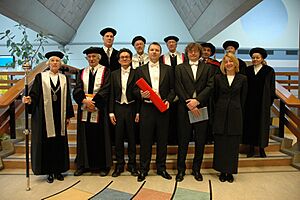
Doctoral studies at TU Delft have two parts. The first year is a trial period. Students must show they can do research at a doctoral level. If they pass an evaluation, they continue for three more years. Their research ends with a doctoral thesis. After the thesis is reviewed, the student gives a formal defense.
Doctoral Defense Ceremony
The doctoral defense is a special ceremony held in the senate room. It lasts exactly one hour. During this time, the student answers questions from a committee. Sometimes, the student has one or two helpers. The ceremony ends when a special official says "Hora est" (which means "It is time" in Latin) and stamps a staff on the floor. The committee then decides if the student will receive the doctorate. If approved, the main professor praises the new doctor.
University Research
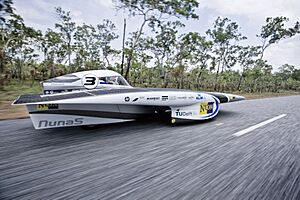
TU Delft researchers have created many new technologies. For example, they developed GLARE, a strong material used in the Airbus A380 airplane. They also created the Vision in Product Design method. The famous Delta Works plan in the Netherlands was partly designed by TU Delft graduates. TU Delft was also a leader in the idea of Open design.
In architecture, TU Delft is known for its Traditionalist School. Many important microbiologists, like Martinus Beijerinck (who discovered viruses in 1898) and Albert Kluyver, worked at TU Delft.
Here are some recent projects developed at the university:
Vehicles Developed at TU Delft
- Superbus: A project to design a very fast bus that can go up to 250 km/h.
- Nuna: A solar-powered race car that has won the World Solar Challenge six times.
- TU Delft Solar Boat Team: A solar-powered boat that "flies" on water using hydrofoils.
- TU Delft Hydro Motion Team: A project building a hydrogen-powered boat that also "flies" using hydrofoils.
- DUT Racing: An electric Formula Student racing car team that has won many competitions and once held a world record.
- Project MARCH: A student team building an exoskeleton for people who cannot move their legs.
- DelFly: A very small flying robot (Micro Air Vehicle) that can carry a camera.
- Forze: A racing car powered by a hydrogen fuel cell.
- Eco-Runner: A vehicle that competes in the Eco-marathon for fuel efficiency.
Other Research Projects
- Flame: The first humanoid robot that can walk like a human.
- Somnox Sleep Robot: A robot shaped like a capsule that helps people sleep by mimicking breathing.
- Kitepower: A system that turns wind energy into electricity using large kites.
- Tribler: An open source program for sharing files and watching online TV.
- Nix and NixOS: An open source program manager and a Linux distribution.
- Delfi-C3: A small CubeSat satellite built by TU Delft students.
- Stratos II+: A sounding rocket that broke the European altitude record for amateur rockets in 2015.
- The Ocean Cleanup: A project to develop ways to clean up plastic from the ocean.
- iGEM TU Delft: A student team that competes in a big international competition in synthetic biology.
- Quantum computing: Research into new ways of computing using quantum mechanics.
University People
Students at TU Delft
Most students at TU Delft are male. In 2021, about 30% of all students were women. The biggest difference between male and female students is in the Mechanical engineering faculty. The smallest difference is in the Industrial Design and Architecture departments. The university is working to balance this.
| 2009 | 2022 | |
|---|---|---|
| PhD Students (total) | 2,027 | 3,144 |
| PhD Students (men) | 1,474 | 2,135 |
| PhD Students (women) | 547 | 1,007 |
| MSc and BSc students (total) | 16,427 | 26,658 |
| MSc and BSc students (foreign) | 2,236 | 6,821 |
| MSc and BSc students (women) | 3,351 | 8,248 |
| BSc students (total) | 10,857 | 13,782 |
| MSc students (total) | 5,524 | 12,876 |
| Student Population | 18,454 | 27,080 |
Since 2002, the number of students at TU Delft has grown a lot. In 2022, nearly 27,000 students were enrolled. The number of international students has also increased. In 2021, 29% of all students came from other countries. Most of these international students came from Europe. In 2022, the largest groups of international students were from China, India, and Belgium.
University Faculty
As of 2015, TU Delft has 437 professors and over 3,375 academic staff. Their jobs include teaching students, guiding research, and doing their own research.
Many famous people have been faculty members at TU Delft. These include Heike Kamerlingh Onnes, who won a Nobel Prize in physics in 1913 for discovering superconductivity. Other notable scientists include Martinus Beijerinck, who founded modern microbiology.
-
Heike Kamerlingh Onnes,
discoverer of superconductivity, TU Delft faculty 1878-1882 -
Martinus Beijerinck,
father of virology, TU Delft faculty 1895-1921 -
Ralph Kronig,
discoverer of particle spin, TU Delft faculty 1939-1969
In engineering, Vic Hayes, known as the "father of Wi-Fi," is connected to the university. Wubbo Ockels, a Dutch astronaut, was also a professor here. Many important architects have taught at TU Delft, including Francine Houben and Winy Maas.
Notable Alumni
Two TU Delft alumni have won the Nobel Prize. Jacobus van 't Hoff won the first Nobel Prize in Chemistry in 1901. Simon van der Meer won the Nobel Prize in Physics in 1984.
Other famous alumni include Jaap Haartsen, who developed Bluetooth. Jeroen van der Veer and Ben van Beurden, former CEOs of Royal Dutch Shell, also studied at TU Delft. Gerard Philips, who co-founded Philips, was another alumnus.
Interesting alumni also include Lodewijk van den Berg, a Dutch-American astronaut, and Prince Friso of Orange-Nassau, a member of the Dutch royal family. The famous artist Maurits Cornelis Escher studied at TU Delft for a year.
-
Jacobus van 't Hoff,
Nobel Prize in chemistry, TU Delft student 1869-1871 -
Gerard Philips,
cofounder of Philips, TU Delft student 1876-1883 -
Ben van Beurden former CEO of Royal Dutch Shell, TU Delft student 1981-1983
Honorary Doctorates
Since 1906, TU Delft has been able to award honorary doctorates. These are given to people who have made amazing contributions in their fields. Some famous people who received honorary doctorates include:
- Gerard Philips (1917), co-founder of Philips.
- Hendrik Antoon Lorentz (1918), a Nobel Prize winner known for his work on electromagnetic radiation.
- Prince Bernhard (1951), a prince of the Netherlands.
- John Douglas Cockcroft (1959), a Nobel Prize winner for his work on splitting atoms.
- Santiago Calatrava (1997), a famous architect.
University Rankings
| University rankings | |
|---|---|
| Global – Overall | |
| ARWU World | 151–200 (2024) |
| CWUR World | 263 (2023) |
| CWTS World | 109 (2023) |
| QS World | 49 (2025) |
| Reuters World | 60 (2019) |
| THE World | =56 (2025) |
| USNWR Global | =187 (2025) |
| Global – Science and engineering | |
| QS Chemistry | 36 (2024) |
| QS Engineering & Tech. | 13 (2024) |
| QS Natural Sciences | 47 (2024) |
| THE Computer Science | 45 (2024) |
| THE Engineering | 16 (2024) |
| THE Physical Sciences | 61 (2024) |
Overall University Rankings
TU Delft is highly ranked among universities worldwide. In the QS World University Rankings 2025, it was ranked 49th globally. It was also ranked 56th worldwide in the THE World University Rankings 2025.
In 2023, TU Delft was also named the 15th most international university in the world by THE. This means it has a lot of students and staff from different countries.
Subject Rankings
TU Delft is especially strong in Engineering and Technology. The QS World University Rankings placed it 13th worldwide for this subject in 2024.
For specific subjects in 2024, TU Delft ranked:
- 3rd worldwide for architecture.
- 3rd for mechanical and aerospace engineering.
- 3rd for civil and structural engineering.
- 11th for chemical engineering.
- 12th for design.
- 14th for electric and electronical engineering.
University Partnerships
TU Delft works with many leading universities across Europe. These partnerships allow students to study abroad and offer combined degree programs.
Some of its main partnerships include:
- IDEA League: A group of top technical universities like TU Delft, ETH Zurich, and RWTH Aachen.
- 4TU: A group of the four main technical universities in the Netherlands, including TU Delft, TU Eindhoven, and University of Twente.
- Leiden-Delft-Erasmus alliance: A partnership with Leiden University and Erasmus University Rotterdam for education and research.
- ENHANCE Alliance: A network of European technical universities.
TU Delft also partners with many universities around the world for student exchange programs.
See also
 In Spanish: Universidad Técnica de Delft para niños
In Spanish: Universidad Técnica de Delft para niños
 | Selma Burke |
 | Pauline Powell Burns |
 | Frederick J. Brown |
 | Robert Blackburn |


